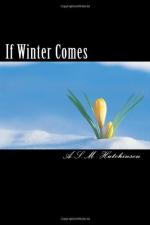“You’d better see the kitchen. It’s awfully nice;” and they went along.
At the kitchen door she paused and began in a mysterious whisper a long account of the servants. “I think they’ll turn out quite nice girls. They’re sisters, you know, and they’re glad to be in a place together. They’ve both got young men in the village. Fancy, the cook told me that at Mrs. Wellington’s where she was, at Chovensbury, she wasn’t allowed to use soda for washing up because Mrs. Wellington fussed so frightfully about the pattern on her china! Fancy, in their family they’ve got eleven brothers and sisters. Isn’t it awful how those kind of people—”
Her voice got lower and lower. She seemed to Mark to be quivering with some sort of repressed excitement, as though the two maids were some rare exhibit which she had captured with a net and placed in the kitchen, and whom it was rather thrilling to open the door upon and peep at. He could hardly hear her voice and had to bend his head. It was dim in the lobby outside the kitchen door. The dimness, her intense whispers and her excitement made him feel that he was in some mysterious conspiracy with her. The whole atmosphere of the house and of this tour of inspection, which had been deliciously absorbing, became mysteriously conspiratorial, unpleasing.
“...She’s been to a school of cookery at Tidborough. She attended the whole course!”
“Good. That’s the stuff!”
“Hush!”
Why hush? What a funny business this was!
VIII
Mabel opened the kitchen door. “The master’s come to see how nice the kitchen looks.”
Two maids in black dresses and an extraordinary amount of stiffly starched aprons and caps and streamers rose awkwardly and bobbed awkward little bows. One was very tall, the other rather short. The tall one looked extraordinarily severe and the short one extraordinarily glum, Mark thought, to have young men. Mabel looked from the girls to Mark and from Mark to the girls, precisely as if she were exhibiting rare specimens to her husband and her husband to her rare specimens. And in the tone of one exhibiting pinned, dried, and completely impersonal specimens, she announced, “They’re sisters. Their name is Jinks.”
Mark, examining the exhibits, had been feeling like a fool. Their name humanized them and relieved his awkward feeling. “Ha! Jinks, eh? High Jinks and Low Jinks, what?” He laughed. It struck him as rather comic; and High Jinks and Low Jinks tittered broadly, losing in the most astonishing way the one her severity and the other her glumness.
Mabel seemed suddenly to have lost her interest in her exhibits and their cage. She rather hurried Mark through the kitchen premises and, moving into the garden, replied rather abstractedly to his plans for the garden’s development.
Suddenly she said, “Mark, I do wish you hadn’t said that in the kitchen.”




